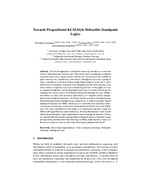Towards Propositional KLM-Style Defeasible Standpoint Logics
Aus International Center for Computational Logic
Towards Propositional KLM-Style Defeasible Standpoint Logics
Nicholas LeisegangNicholas Leisegang, Thomas MeyerThomas Meyer, Sebastian RudolphSebastian Rudolph
Nicholas Leisegang, Thomas Meyer, Sebastian Rudolph
Towards Propositional KLM-Style Defeasible Standpoint Logics
In Aurona Gerber, Jacques Maritz, Anban W. Pillay, eds., Proceedings of the 5th Southern African Conference on AI Research (SACAIR'24), volume 2326 of CCIS, 459–475, 2024. Springer
Towards Propositional KLM-Style Defeasible Standpoint Logics
In Aurona Gerber, Jacques Maritz, Anban W. Pillay, eds., Proceedings of the 5th Southern African Conference on AI Research (SACAIR'24), volume 2326 of CCIS, 459–475, 2024. Springer
- KurzfassungAbstract
The KLM approach to defeasible reasoning introduces a weakened form of implication into classical logic. This allows one to incorporate exceptions to general rules into a logical system, and for old conclusions to be withdrawn upon learning new contradictory information. Standpoint logics are a group of logics, introduced to the field of Knowledge Representation in the last 5 years, which allow for multiple viewpoints to be integrated into the same ontology, even when certain viewpoints may hold contradicting beliefs. In this paper, we aim to integrate standpoints into KLM propositional logic in a restricted setting. We introduce the logical system of Defeasible Restricted Standpoint Logic (DRSL) and define its syntax and semantics. Specifically, we integrate ranked interpretations and standpoint structures, which provide the semantics for propositional KLM and propositional standpoint logic respectively, in order to introduce ranked standpoint structures for DRSL. Moreover, we extend the non-monotonic entailment relation of rational closure from the propositional KLM case to the DRSL case. The main contribution of this paper is to characterize rational closure for DRSL both algorithmically and semantically, showing that rational closure can be characterized through a single representative ranked standpoint structure. Finally, we conclude that the semantic and algorithmic characterizations of rational closure are equivalent, and that entailment-checking for DRSL under rational closure is in the same complexity class as entailment-checking for propositional KLM. - Weitere Informationen unter:Further Information: Link
- Projekt:Project: SECAI, ScaDS.AI
- Forschungsgruppe:Research Group: Computational LogicComputational Logic
@inproceedings{LMR2024,
author = {Nicholas Leisegang and Thomas Meyer and Sebastian Rudolph},
title = {Towards Propositional {KLM-Style} Defeasible Standpoint Logics},
editor = {Aurona Gerber and Jacques Maritz and Anban W. Pillay},
booktitle = {Proceedings of the 5th Southern African Conference on {AI}
Research (SACAIR'24)},
series = {CCIS},
volume = {2326},
publisher = {Springer},
year = {2024},
pages = {459{\textendash}475},
doi = {10.1007/978-3-031-78255-8_27}
}
